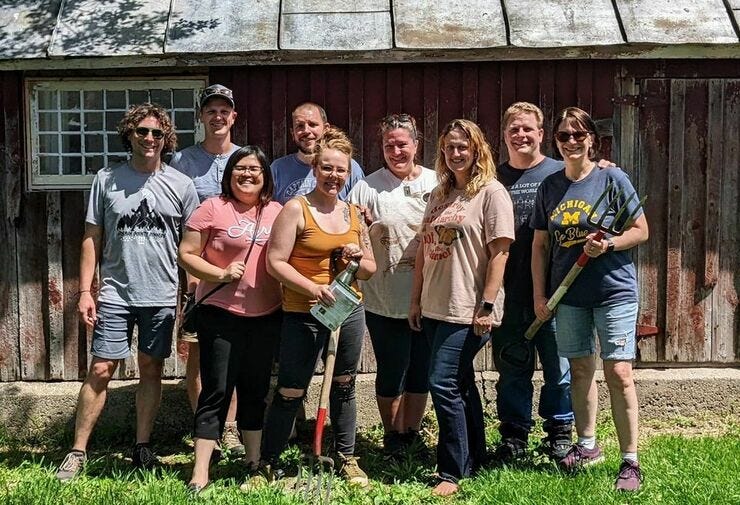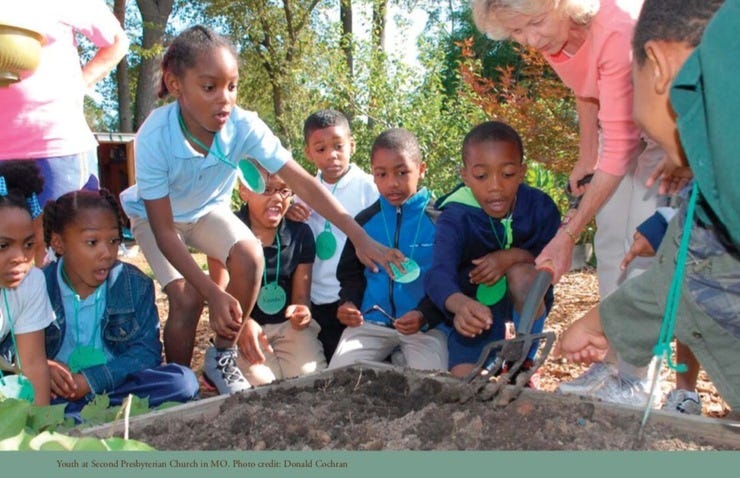Refugia Newsletter #15 by Debra Rienstra: day(s) of reckoning for the fossil fuel industry, forest health as climate mitigation strategy, church-of-refugia resources, and visiting the beach on V-E Day
Refugia News
Last week, co-conspirator/husband Ron and I spent a full week with seven amazing pastor folks who are beginning their Doctor of Ministry studies under our direction at Western Theological Seminary. As I mentioned last time, our cohort theme is "church of refugia," and we will be exploring together what it might look like to recast our vision of the church, not as a place to bunker or a handmaiden of empire, but as the cultivator of refugia spaces.
What struck us all, I think, is the sheer heaviness of living in a time of such upheaval. At the center of the Christian faith is resurrection life, the belief that God brings life out of the midst of death--compost theology, you might say. So our cohort is wondering together: out of the many, many kinds of death we are experiencing now in our institutions, the earth, and ourselves, out of all the disillusionment, wounds, corruptions, and disruptions, where is God creating refugia where new things can grow?
Well, help us out here. If you are seeing God at work in a refugia kind of way, let us know. You can just reply to this newsletter.
Meanwhile, I'm happy to report that I recorded a guest appearance on another podcast, this time with the wise and winsome Lee Camp of the Tokens podcast. Probably won't release for a few months, but I'll let you know when the episode is available.
This Week in Climate News
Americans feel our addiction to fossil fuels more keenly these days as we pay $4-5 a gallon at the pump knowing full well that the fossil fuel industry continues to rake in unimaginably huge profits and resist any efforts at a windfall tax, even though 80% of voters like the idea. Could it be that we are waking up to the depth of the fossil fuel industry's power and corruption?
Of all the climate news stories in the past two weeks, the piece linked below gave me the most schadenfreude-ish pleasure. I greet the promise of this opinion piece in The Hill by Richard Wiles with cautious hope, but the basic idea is that we are now in a position to prove and expose that "lying has been Big Oil's business model."
The fossil fuel industry has known since at least the 1980s that burning their products causes climate change. They have also known that plastics--the other giant product category of the industry--cannot be recycled as easily and cheerfully as they have led the public to believe. To hide what they knew, they deliberately created public confusion on climate science and public recycling campaigns to make it all seem OK.
How did they do that? Well, this is what is now being uncovered in detail. Not only the recent congressional investigation, but also numerous lawsuits are exposing documents, recording insider testimony, and otherwise turning over slimy rocks. A new PBS series is already out and a documentary will be released soon. I'm hopeful that these sorts of stories will raise greater public awareness of what we're really up against.
When dealing with power and corruption, the basic principle of course is follow the money. So another sign that Big Oil's power may be diminishing is that investment groups are changing their metrics. BlackRock, for example, predicts that "by 2030 at least three quarters of its investments in companies and governments will be tied to issuers with a scientific target to cut net greenhouse gas emissions to zero by 2050, up from 25% currently."
Now, it's not quite as virtuous as that might sound. The rest of the article points out that this is what BlackRock predicts--they're not committing to that. Yes, they're asking for information about companies' climate-related policies and practices. Yes, they're developing "products" for investors who care about climate. But they're also waiting for governments to do their part, and governments are waiting for people to do their part, and people are waiting for leadership from governments and investment firms--well, you see the problem.
Still! The people whose job is literally to follow the money are saying that the money is shifting. That's good. (We could quibble over net-zero, too, but moving on...)
The industry’s days of escaping accountability for its deception are clearly numbered.
Deeper Dive
National Geographic's May issue focuses on "Saving Forests" because, as the issue's many gorgeous photos and maps detail, forests are "key to protecting the planet." Forests are the lungs of the planet, breathing in and sequestering carbon and breathing out oxygen. But researchers are discovering more details about how important forests are to biodiversity, cooling, water cycle management, soil protection, and more. Protecting the health of the planet's forests, in other words, should be a key strategy in climate mitigation. This is especially true for the planet's biggest forest systems in the Amazon, Congo, and Southeast Asia. But everything counts.
Here's a piece in The Guardian that summarizes some of the new research on what forests do. Bottom line: “Better protection, expansion and improved management of the world’s forests are considered by many experts as among the most promising nature-based solutions.” For the wonkishly inclined, here comes the actual science.
In light of all this, I was pleased to see that back on Earth Day, President Biden signed an Executive Order full of goodies meant to help protect America's forests and to support forest protection abroad (link below). The order presents four categories of investment:
protecting old-growth forests on federal lands, especially from wildfire risk
working on reforestation (including for "forest product" purposes, but OK)
combatting global deforestation
deploying "nature-based solutions that reduce emissions and build resilience."
The details are interesting. For instance, I'm always surprised that these sorts of initiatives have to start... with mapping! We don't even know what we've got, essentially, so we have to map our forests. Another data project: the Office of Management and Budget will be asked to put dollar amounts on what forests provide in terms of "ecosystem services" (i.e., not just board feet of lumber). I note a welcome call to listen to and heed Traditional Ecological Knowledge, which is to say, indigenous peoples' wisdom. And I appreciate the parts about figuring out how to "combat commodity-driven deforestation" internationally, a particular problem with the beef, soy, and palm oil industries.
Well, as with all ambitious plans like these: we'll see.
Refugia Sighting
Shout out this week to the good people at Creation Justice Ministries, a group based in Washington D.C. and deriving originally from an initiative of the National Council of Churches. Their mission:
"Creation Justice Ministries educates, equips, and mobilizes Christian individuals, congregations, denominations, and communions to protect, restore, and rightly share God's creation."
In other words, as I would put it: CJM resources refugia churches.
Need some education materials around climate for your church? CJM has some. Need some ideas to help your folks know how to advocate? CJM can help. Want to know more about eco-justice? They're on it. Worship resources? Check. Sermon ideas? Check.
I highly recommend clicking around on their website and signing up for their newsletter so you can receive word about their webinars and other good stuff.
Christian perspectives on justice for creation, equipping the church for eco-justice.
The Wayback Machine
I've been thinking about my parents lately, who died within three weeks of each other in the spring of 2015. I mention them often in Refugia Faith, and right before chapter 5, I reflect briefly on the fact that on May 8, 1945--V-E Day--they went to the beach. The couple sentences about this in the book don't really do justice to this longer essay, which I wrote first and which, I think, is a much better account of why finding the photos of this event meant so much to me. Here's the full, original essay, written in October 2020. It's about living with the unknown as the great events of history sweep over us.
On V-E Day, they went to the beach.
Thank you!
Thanks for reading! I keep these newsletters quickly scannable, with opportunities for deeper reading as you are able. I also tend to emphasize the connections between faith communities and climate action.
You can send me a response to this newsletter simply by replying to the email that brought it to you. If you are so inclined, please follow me on Twitter or Facebook @debrakrienstra. You can always contact me on those platforms, too. Also check out my website at debrarienstra.com.
If you like this newsletter, please share with others!





